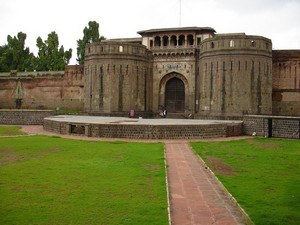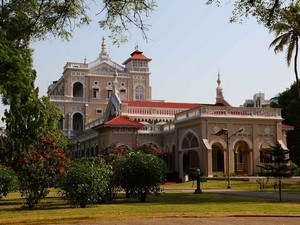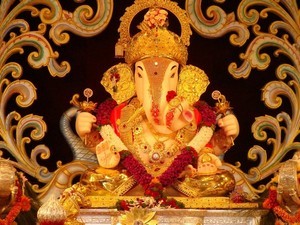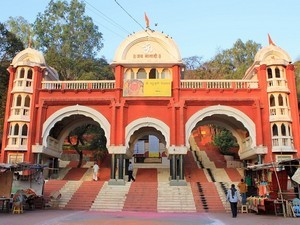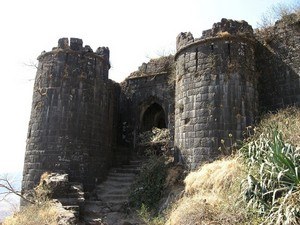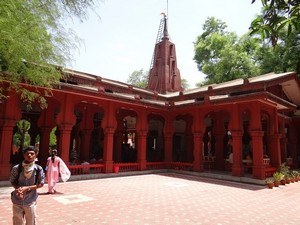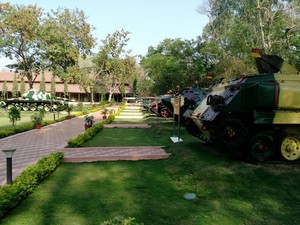Shree Chintamani Vinayaka Temple - Theur, Pune - Timings, Festivals, History, Darshan, Pooja Timings
Photo Credit: Flickr
 India | Maharashtra | Pune
India | Maharashtra | Pune
 #63 of 63 Places to Visit in Pune
#63 of 63 Places to Visit in Pune
 Distance (From Pune): 25 Kms
Distance (From Pune): 25 Kms
 Trip Duration (Including Travel): 4 Hours/Half Day
Trip Duration (Including Travel): 4 Hours/Half Day
 Transportation Options: Bus / Cab
Transportation Options: Bus / Cab
 Travel Tips: None
Travel Tips: None
About Theur Chintamani Temple
At a distance of 25 Km from Pune & 176 km from Mumbai, Chintamani Temple is a Hindu temple situated at Theur in the Pune district of Maharashtra. Located near the confluence of river Bhima and the conjoint of rivers Mula & Mutha, the temple is dedicated to Lord Ganesha, the elephant-headed god of wisdom. It is one of the eight Ashtavinayak temples venerating Lord Ganesha in Maharashtra, bearing immense religious importance in Hinduism. The other Ashtavinayak Temples in Maharashtra being Moreshwar in Morgaon, Ballaleshwar in Pali, Maha Ganapati Temple in Ranjangaon, Varadavinayak in Mahad, Siddhivinayak in Siddhatek, Girijatmaj in Lenyadri, and Vighneshwar in Ozar. Chintamani Ganpati Temple in Theur is the fifth temple to be visited as per the traditional sequence of the Ashtavinayak Yatra, and among the most sacred places to visit near Pune.
History of Theur Chintamani Temple
As per the historical records, there is no specific information regarding the construction date or the builder of the Theur Chintamani Ganpati temple. However, it is widely believed that the temple has been in existence for a considerable period. The current main structure of the temple was erected by the descendants of Morya Gosavi. The Chintamani Temple served as a significant spiritual center for the Peshwa rulers, particularly Madhavrao I (1745-1772), who undertook renovations and constructed the Sabha mandap. He also installed a large bell at the site. Following the passing of Peshwa Madhavrao and Ramabai, a garden was established within the temple grounds. Currently, the temple is maintained by the Chinchwad Devasthan Trust, which also governs Morgaon and Siddhatek Ashtavinayak temples.
Mythology of Theur Chintamani Temple
The Chintamani Temple in Theur is linked to various legends, primarily centered on Lord Ganesha and the wish-fulfilling Chintamani jewel. According to one tale, King Abhijeet and his queen performed intense penance, resulting in the birth of their son, Ganaraja, also referred to as Guna. When Ganaraja visited the ashram of Sage Kapila, the sage utilized the precious Chintamani jewel to provide food for the prince. However, driven by greed, Ganaraja forcibly seized the jewel from the sage. In response, Goddess Durga advised Sage Kapila to seek assistance from Lord Ganesha. Subsequently, Lord Ganesha defeated Ganaraja beneath a Kadamba tree, reclaimed the jewel, and returned it to Sage Kapila. In gratitude, the sage adorned Lord Ganesha with the jewel around his neck, leading to the Lord being revered as Chintamani Vinayak.
Another narrative recounts that Lord Brahma experienced restlessness and an unsettled mind. To find peace, he meditated on Lord Ganesha in this village. The name Theur is derived from the Sanskrit term 'Sthavar,' which translates to stable place. As Ganesha alleviated Brahma's Chintas, or worries, he became known as Chintamani Ganesh.
Architecture of Theur Chintamani Temple
The Chintamani Ganpati temple showcases a variety of striking architectural styles. It ranks among the largest of the eight revered temples known as Ashtavinayakas in Maharashtra. The main entrance is situated to the north, while the central idol of Chintamani Ganesha is oriented towards the east. Similar to other Ashtavinyaka idols, this central figure of Ganesha is regarded as self-manifested, with only a few features discernible, including an elephant like head studded with jewel eyes, and trunk, which turns to his left. The idol is depicted in a cross-legged position and is coated with sindur.
The temple features a wooden Sabha-mandapa (assembly hall) constructed by Madhavrao I, which includes a black stone water fountain. In addition to the main shrine dedicated to Ganesha, the temple complex houses several smaller shrines devoted to Lord Shiva, Lord Vishnu, and Lord Hanuman. At the rear of the temple lies the Peshwa Wada, which was formerly the residence of Madhavrao I; it now serves as the hub for the temple's daily operations.
Festivals of Theur Chintamani Temple
Ganesh Chaturthi, occurring in August or September, is celebrated with quiet pomp and glory in Theur. During this ten-day festival, numerous visitors flock to the Chintamani Temple to witness the grand celebrations. Another significant festival is Maghi Chaturthi, which takes place in January or February. This celebration commences on the fourth day, known as Chaturthi, and continues until the eighth day, referred to as Ashtami, within the same month. Additionally, the temple celebrates the Rama-Madhav Punyotsav, which honors the death anniversary of Madhavrao and his wife Ramabai, occurring on the eighth day of the Kartik month.
Dress Code & Other Restrictions of Theur Chintamani Temple
Chintamani Temple in Theur does not enforce a strict dress code; however, it is advisable to wear modest attire that covers the upper arms and legs as a mark of respect. Men are encouraged to don a dhoti or pajama along with an appropriate upper garment, or to wear formal trousers and shirts. Women may choose to wear a saree, half saree, or chudidhars. It is recommended to avoid modern clothing such as mini-skirts, shorts, and sleeveless tops while visiting the temple.
Non-Hindus are generally not allowed inside the main sanctum sanctorum of the temple. However, they can often appreciate the temple's architecture and surroundings from outside.
Theur Chintamani Temple Timings
Monday: 6 AM - 1 PM & 2 PM - 10 PM
Tuesday: 6 AM - 1 PM & 2 PM - 10 PM
Wednesday: 6 AM - 1 PM & 2 PM - 10 PM
Thursday: 6 AM - 1 PM & 2 PM - 10 PM
Friday: 6 AM - 1 PM & 2 PM - 10 PM
Saturday: 6 AM - 1 PM & 2 PM - 10 PM
Sunday: 6 AM - 1 PM & 2 PM - 10 PM
Theur Chintamani Temple Entry Fee
General Entry is Free
Special Darshan available for Rs. 100
Best Time to Visit Theur Chintamani Temple
The ideal period to visit Theur Chintamani Temple is between August and February, as the weather during this time is pleasant and conducive for temple exploration. Those interested in experiencing the festivities should consider visiting during Ganesh Chaturthi, when the temple is adorned with flowers and lights, and various religious events are held. However, visitors should note that this is the peak season, leading to larger crowds. For a more tranquil experience, the monsoon months of July to September are suitable that offer a lush and vibrant landscape. Additionally, it is recommended to avoid visiting during the summer months due to the extreme heat.
How to Reach Theur Chintamani Temple
Pune boasts excellent connectivity through air, rail, and road transport. The nearest airport, Pune International Airport, is located approximately 10 kilometers from the city and offers flights to numerous international destinations, including Dubai, Thailand, Malaysia, Singapore, the USA, Europe, and Sri Lanka, as well as domestic routes to major cities such as Mumbai, Hyderabad, Bangalore, Chennai, Delhi, Jaipur, Kochi, Trivandrum, Kolkata, and Goa. Pune Junction Railway Station provides robust train services linking the city to all significant towns and cities across India, including Mumbai, Delhi, Kolkata, Chennai, Hyderabad, and Bangalore. Additionally, Pune is well-served by bus routes connecting it to nearly all cities and towns in Maharashtra, Karnataka, and Telangana. About 22 Km from Pune Junction, Chintamani Temple in Theur can be easily accessed by state buses or by hiring a cab from Pune & Mumbai.




